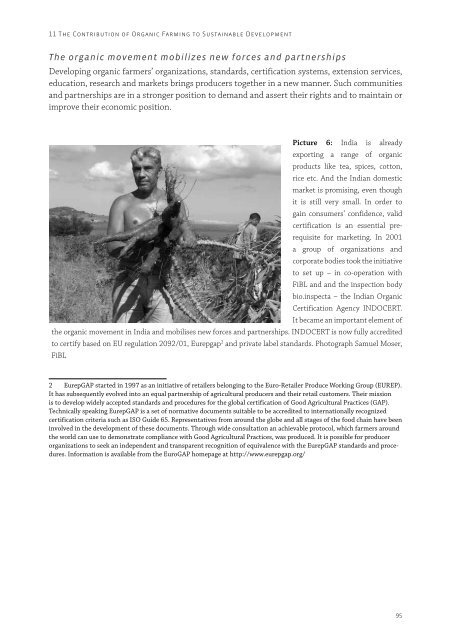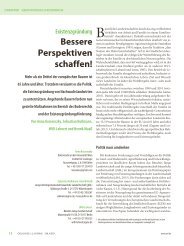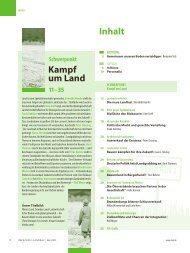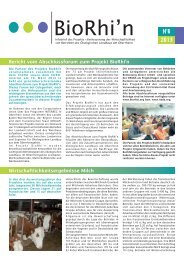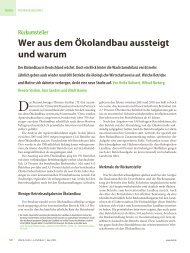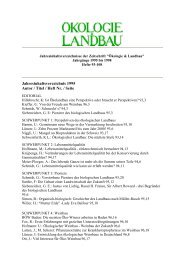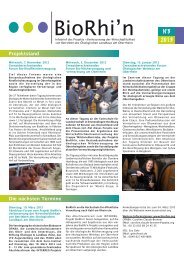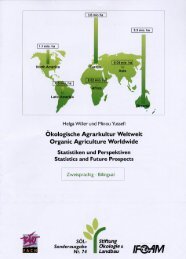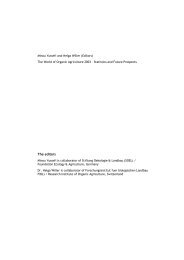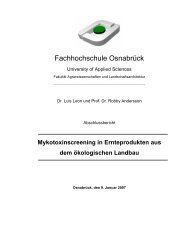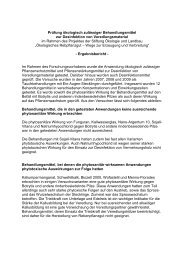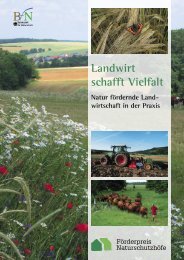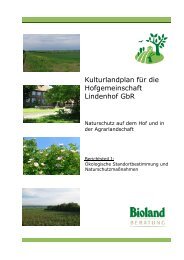the world of organic agriculture - Organic Eprints
the world of organic agriculture - Organic Eprints
the world of organic agriculture - Organic Eprints
You also want an ePaper? Increase the reach of your titles
YUMPU automatically turns print PDFs into web optimized ePapers that Google loves.
11 The Contribution <strong>of</strong> <strong>Organic</strong> Farming to Sustainable Development<br />
The <strong>organic</strong> movement mobilizes new forces and partnerships<br />
Developing <strong>organic</strong> farmers’ organizations, standards, certification systems, extension services,<br />
education, research and markets brings producers toge<strong>the</strong>r in a new manner. Such communities<br />
and partnerships are in a stronger position to demand and assert <strong>the</strong>ir rights and to maintain or<br />
improve <strong>the</strong>ir economic position.<br />
Picture 6: India is already<br />
exporting a range <strong>of</strong> <strong>organic</strong><br />
products like tea, spices, cotton,<br />
rice etc. And <strong>the</strong> Indian domestic<br />
market is promising, even though<br />
it is still very small. In order to<br />
gain consumers’ confidence, valid<br />
certification is an essential prerequisite<br />
for marketing. In 2001<br />
a group <strong>of</strong> organizations and<br />
corporate bodies took <strong>the</strong> initiative<br />
to set up – in co-operation with<br />
FiBL and and <strong>the</strong> inspection body<br />
bio.inspecta – <strong>the</strong> Indian <strong>Organic</strong><br />
Certification Agency INDOCERT.<br />
It became an important element <strong>of</strong><br />
<strong>the</strong> <strong>organic</strong> movement in India and mobilises new forces and partnerships. INDOCERT is now fully accredited<br />
to certify based on EU regulation 2092/01, Eurepgap 2 and private label standards. Photograph Samuel Moser,<br />
FiBL<br />
2 EurepGAP started in 1997 as an initiative <strong>of</strong> retailers belonging to <strong>the</strong> Euro-Retailer Produce Working Group (EUREP).<br />
It has subsequently evolved into an equal partnership <strong>of</strong> agricultural producers and <strong>the</strong>ir retail customers. Their mission<br />
is to develop widely accepted standards and procedures for <strong>the</strong> global certification <strong>of</strong> Good Agricultural Practices (GAP).<br />
Technically speaking EurepGAP is a set <strong>of</strong> normative documents suitable to be accredited to internationally recognized<br />
certification criteria such as ISO Guide 65. Representatives from around <strong>the</strong> globe and all stages <strong>of</strong> <strong>the</strong> food chain have been<br />
involved in <strong>the</strong> development <strong>of</strong> <strong>the</strong>se documents. Through wide consultation an achievable protocol, which farmers around<br />
<strong>the</strong> <strong>world</strong> can use to demonstrate compliance with Good Agricultural Practices, was produced. It is possible for producer<br />
organizations to seek an independent and transparent recognition <strong>of</strong> equivalence with <strong>the</strong> EurepGAP standards and procedures.<br />
Information is available from <strong>the</strong> EuroGAP homepage at http://www.eurepgap.org/<br />
95


